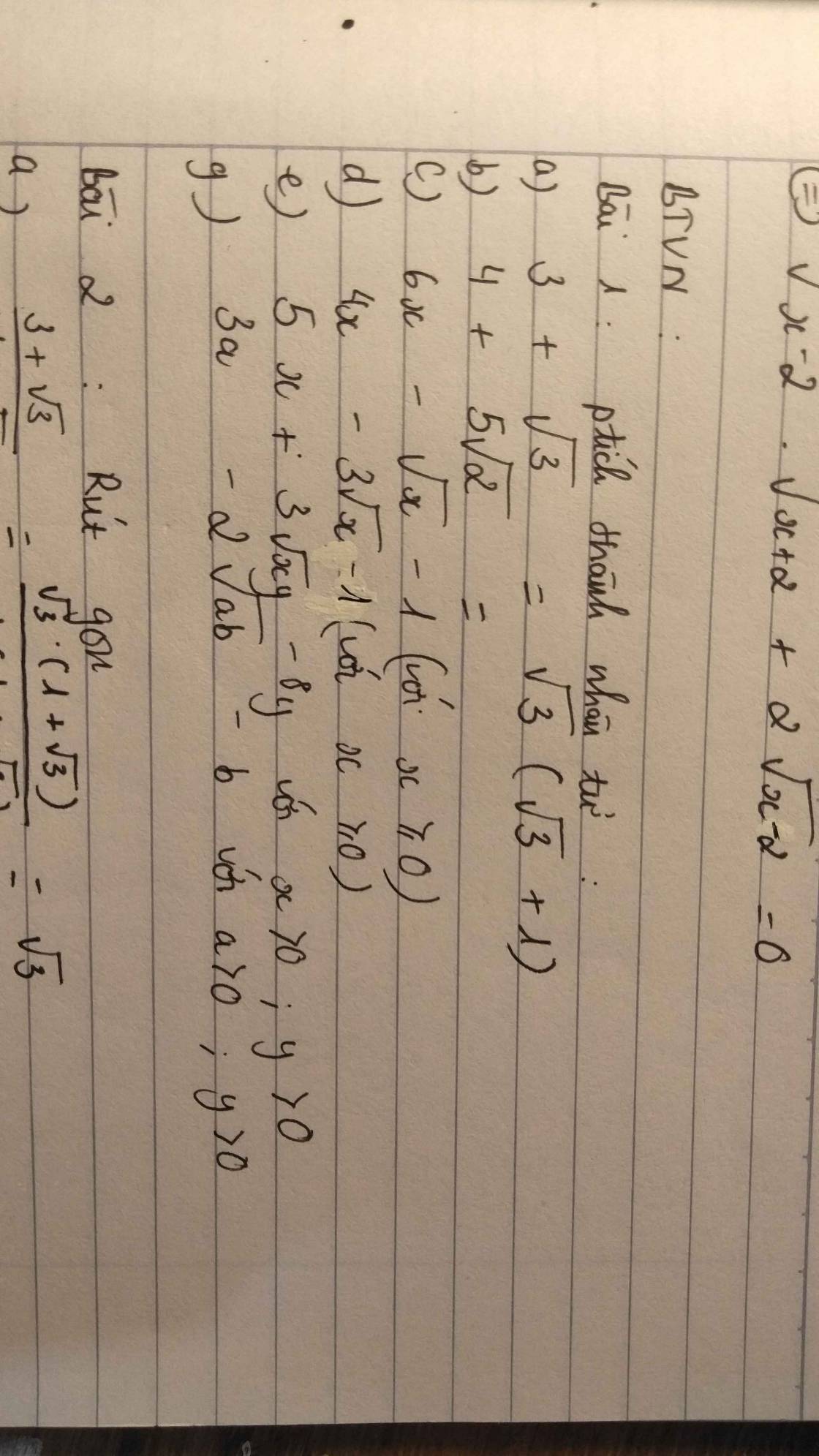\(\sqrt{5-x}=2x-7\)
Hãy nhập câu hỏi của bạn vào đây, nếu là tài khoản VIP, bạn sẽ được ưu tiên trả lời.


ĐKXĐ : \(x\ge-1\)
\(x^2+x+12\sqrt{x+1}=36\)
\(\Leftrightarrow\left(x^2+2x+1\right)-\left(x+1-12\sqrt{x+1}+36\right)=0\)
\(\Leftrightarrow\left(x+1\right)^2-\left(\sqrt{x+1}-6\right)^2=0\)
\(\Leftrightarrow\left(x+\sqrt{x+1}-5\right)\left(x-\sqrt{x+1}+7\right)=0\)
\(\Leftrightarrow\left[{}\begin{matrix}\sqrt{x+1}=5-x\\\sqrt{x+1}=x+7\end{matrix}\right.\)
Với \(\sqrt{x+1}=5-x\)
<=> \(\left\{{}\begin{matrix}x+1=x^2-10x+25\\-1\le x\le5\end{matrix}\right.\Leftrightarrow\left\{{}\begin{matrix}x^2-11x+24=0\\-1\le x\le5\end{matrix}\right.\)
\(\Leftrightarrow\left[{}\begin{matrix}\left(x-3\right)\left(x-8\right)=0\\-1\le x\le5\end{matrix}\right.\Leftrightarrow x=3\)
Với \(\sqrt{x+1}=x+7\Leftrightarrow\left\{{}\begin{matrix}x+1=x^2+14x+49\\x\ge-1\end{matrix}\right.\Leftrightarrow\left\{{}\begin{matrix}x^2+13x+48=0\\x\ge-1\end{matrix}\right.\)
\(\Leftrightarrow∄x\)
Vậy tập nghiệm S = {3}



a/
Xét tg vuông ABH có
\(AH^2=AE.AB\) (trong tg vuông bình phương 1 cạnh góc vuông bằng tích giữa hình chiếu cạnh góc vuông đó trên cạnh huyền với cạnh huyền) (1)
Xét tg vuông ACH có
\(AH^2=AF.AC\)(trong tg vuông bình phương 1 cạnh góc vuông bằng tích giữa hình chiếu cạnh góc vuông đó trên cạnh huyền với cạnh huyền) (2)
Từ (1) và (2) \(\Rightarrow AE.AB=AF.AC\)
b/
Ta có
\(\widehat{AEH}=\widehat{AFH}\) => AEHF là tứ giác nội tiếp
\(\Rightarrow\widehat{AFE}=\widehat{AHE}\) (góc nội tiếp chùng chắn cung AE)
c/
AEHF là tứ giác nội tiếp (cmt)
\(\Rightarrow\widehat{EAH}=\widehat{EFH}\) (góc nội tiếp chùng chắn cung EH)

1a.
$3+\sqrt{3}=\sqrt{3}.\sqrt{3}+\sqrt{3}=\sqrt{3}(\sqrt{3}+1)$
1b.
4+5\sqrt{2}=2\sqrt{2}.\sqrt{2}+5\sqrt{2}=\sqrt{2}(2\sqrt{2}+5)$
1c.
$6x-\sqrt{x}-1=(6x-3\sqrt{x})+(2\sqrt{x}-1)$
$=3\sqrt{x}(2\sqrt{x}-1)+(2\sqrt{x}-1)=(2\sqrt{x}-1)(3\sqrt{x}+1)$
1d.
$4x-3\sqrt{x}-1=(4x-4\sqrt{x})+(\sqrt{x}-1)$
$=4\sqrt{x}(\sqrt{x}-1)+(\sqrt{x}-1)=(\sqrt{x}-1)(4\sqrt{x}+1)$
1e.
$5x+3\sqrt{xy}-8y=(5x-5\sqrt{xy})+(8\sqrt{xy}-8y)$
$=5\sqrt{x}(\sqrt{x}-\sqrt{y})+8\sqrt{y}(\sqrt{x}-\sqrt{y})$
$=(\sqrt{x}-\sqrt{y})(5\sqrt{x}+8\sqrt{y})$
1g.
$3a-2\sqrt{ab}-b=(3a-3\sqrt{ab})+(\sqrt{ab}-b)$
$=3\sqrt{a}(\sqrt{a}-\sqrt{b})+\sqrt{b}(\sqrt{a}-\sqrt{b})$
$=(\sqrt{a}-\sqrt{b})(3\sqrt{a}+\sqrt{b})$

`a)`\(D=\dfrac{x^2-x-1}{3x}+\left(\dfrac{x+2}{3x}+\dfrac{3x+1}{x+1}\right):\dfrac{2-4x}{x+1}\);\(x\ne-1;0\)
\(D=\dfrac{x^2-x-1}{3x}+\left[\dfrac{\left(x+2\right)\left(x+1\right)+3x\left(3x+1\right)}{3x\left(x+1\right)}\right].\dfrac{x+1}{2-4x}\)
\(D=\dfrac{x^2-x-1}{3x}+\dfrac{x^2+3x+2+9x^2+3x}{3x\left(x+1\right)}.\dfrac{x+1}{2-4x}\)
\(D=\dfrac{x^2-x-1}{3x}+\dfrac{10x^2+6x+2}{3x\left(x+1\right)}.\dfrac{x+1}{2-4x}\)
\(D=\dfrac{x^2-x-1}{3x}+\dfrac{10x^2+6x+2}{3x\left(2-4x\right)}\)
\(D=\dfrac{\left(2-4x\right)\left(x^2-x-1\right)+10x^2+6x+2}{3x\left(2-4x\right)}\)
\(D=\dfrac{2x^2-2x-2-4x^3+4x^2+4x+10x^2+6x+2}{3x\left(2-4x\right)}\)
\(D=\dfrac{-4x^3+12x^2+8x}{3x\left(2-4x\right)}\)
\(D=\dfrac{-4x\left(x^2+3x+2\right)}{3x\left(2-4x\right)}\)
\(D=-\dfrac{4\left(x+1\right)\left(x+2\right)}{3\left(2-4x\right)}\)
`b)`\(\left|2x-1\right|=4-x\)
\(\Leftrightarrow\left[{}\begin{matrix}2x-1=4-x;x\ge\dfrac{1}{2}\\1-2x=4-x;x< \dfrac{1}{2}\end{matrix}\right.\) \(\Leftrightarrow\left[{}\begin{matrix}x=\dfrac{5}{3}\left(tm\right)\\x=-3\left(tm\right)\end{matrix}\right.\)
`@`Với `x=5/3` thế vào D, ta được:
\(D=-\dfrac{4\left(\dfrac{5}{3}+1\right)\left(\dfrac{5}{3}+2\right)}{3\left(2-4.\dfrac{5}{3}\right)}=\dfrac{176}{63}\)
`@`Với `x=-3` thế vào D, ta được:
\(D=-\dfrac{4\left(-3+1\right)\left(-3+2\right)}{3\left(2-4.-3\right)}=-\dfrac{4}{21}\)
`c)`\(D=\dfrac{5}{3}\)
`<=>`\(\dfrac{5}{3}=-\dfrac{4\left(x+1\right)\left(x+2\right)}{3\left(2-4x\right)}\)
\(\Leftrightarrow5\left(2-4x\right)=-4\left(x+1\right)\left(x+2\right)\)
\(\Leftrightarrow10-20x=-4x^2-12x-8\)
\(\Leftrightarrow4x^2+8x+2=0\)
\(\Leftrightarrow2x^2+4x+1=0\)
\(\Delta=4^2-4.2=16-8=8>0\)
\(\rightarrow\left[{}\begin{matrix}x=\dfrac{-4+\sqrt{8}}{4}=\dfrac{-2+\sqrt{2}}{2}\left(tm\right)\\x=\dfrac{-4-\sqrt{8}}{4}=\dfrac{-2-\sqrt{2}}{2}\left(tm\right)\end{matrix}\right.\)
`d)`\(D>0\)
`<=>`\(-\dfrac{4\left(x+1\right)\left(x+2\right)}{3\left(2-4x\right)}>0\)
`<=>`\(\dfrac{4\left(x+1\right)\left(x+2\right)}{3\left(2-4x\right)}< 0\)
\(\Leftrightarrow\left\{{}\begin{matrix}4\left(x+1\right)\left(x+2\right)>0\\3\left(2-4x\right)< 0\end{matrix}\right.\) hoặc \(\Leftrightarrow\left\{{}\begin{matrix}4\left(x+1\right)\left(x+2\right)< 0\left(1\right)\\3\left(2-4x\right)>0\left(2\right)\end{matrix}\right.\)
\(\Leftrightarrow\left\{{}\begin{matrix}x>-1\\x>\dfrac{1}{2}\end{matrix}\right.\)\(\rightarrow x>\dfrac{1}{2}\) | \(\left(1\right)\Leftrightarrow\left[{}\begin{matrix}x+1>0\\x+2< 0\end{matrix}\right.\) hoặc \(\left[{}\begin{matrix}x+1< 0\\x+2>0\end{matrix}\right.\)
\(\Leftrightarrow\left[{}\begin{matrix}x>-1\\x< -2\end{matrix}\right.\) hoặc \(\left[{}\begin{matrix}x< -1\\x>-2\end{matrix}\right.\)
\(\left(2\right)\Leftrightarrow2-4x>0\)
\(\Leftrightarrow x< \dfrac{1}{2}\)

Lời giải:
$\sqrt{7+\sqrt{2x}}=3+\sqrt{5}$
$7+\sqrt{2x}=(3+\sqrt{5})^2=14+6\sqrt{5}$
$\sqrt{2x}=7+6\sqrt{5}$
$2x=(7+6\sqrt{5})^2=229+84\sqrt{5}$
$x=114,5+42\sqrt{5}$


\(\sqrt{5-x}=2x-7\)
\(\Leftrightarrow\left\{{}\begin{matrix}2x-7\ge0\\5-x=\left(2x-7\right)^2\end{matrix}\right.\)
\(\Leftrightarrow\left\{{}\begin{matrix}x\ge\dfrac{7}{2}\\5-x=4x^2-28x+49\end{matrix}\right.\)
\(\Leftrightarrow\left\{{}\begin{matrix}x\ge\dfrac{7}{2}\\4x^2-27x+44=0\end{matrix}\right.\)
\(\Leftrightarrow\left\{{}\begin{matrix}x\ge\dfrac{7}{2}\\4x^2-16x-11x+44=0\end{matrix}\right.\)
\(\Leftrightarrow\left\{{}\begin{matrix}x\ge\dfrac{7}{2}\\4x\left(x-4\right)-11\left(x-4\right)=0\end{matrix}\right.\)
\(\Leftrightarrow\left\{{}\begin{matrix}x\ge\dfrac{7}{2}\\\left(x-4\right)\left(4x-11\right)=0\end{matrix}\right.\)
\(\Leftrightarrow\left\{{}\begin{matrix}x\ge\dfrac{7}{2}\\\left[{}\begin{matrix}x=4\left(nhận\right)\\x=\dfrac{11}{4}\left(loại\right)\end{matrix}\right.\end{matrix}\right.\)
\(\Leftrightarrow x=4\)
- Thử lại, ta có \(x=4\) là nghiệm của phương trình trên.
- Vậy \(S=\left\{4\right\}\)
Điều kiện : \(x\le5\)
+) Với \(2x-7< 0\Leftrightarrow x< \dfrac{7}{2}\Rightarrow VP< 0\)
=> Phương trình vô nghiệm
+) Với \(2x-7>0\Leftrightarrow x>\dfrac{7}{2}\Rightarrow VP>0\)
Ta có phương trình :
\(5-x=\left(2x-7\right)^2\)
\(\Leftrightarrow5-x=4x^2-28x+49\)
\(\Leftrightarrow4x^2-27x+44=0\)
\(\Leftrightarrow\left[{}\begin{matrix}x=4\left(tm\right)\\x=\dfrac{11}{4}\left(ktm\right)\end{matrix}\right.\)
Vậy x = 4